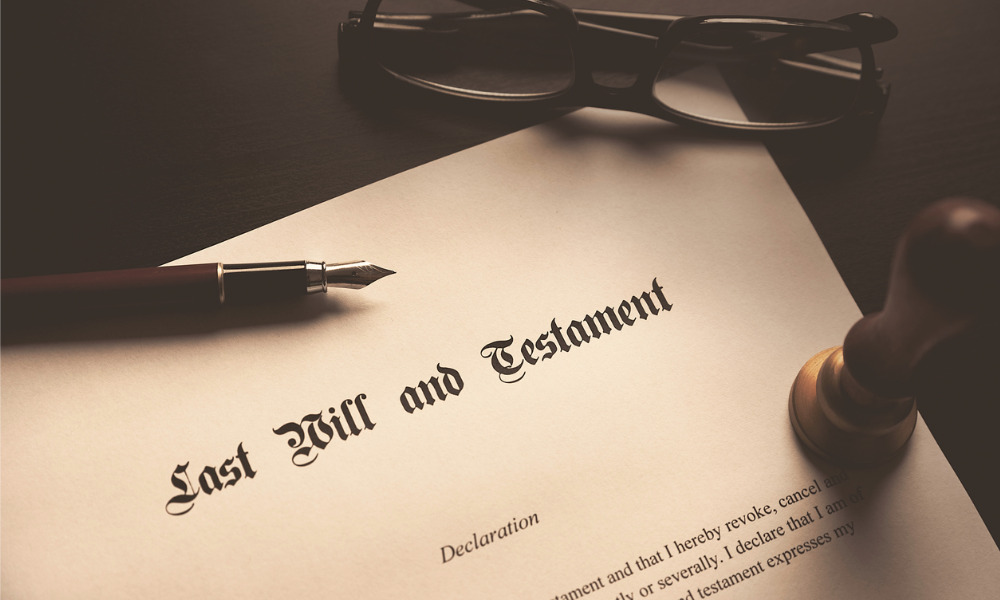Willful’s Erin Bury explains three steps for advisors to help steer families away from legacy planning pitfalls

When Scholastic CEO Richardson Robinson Jr. died unexpectedly, at the age of 84, in June, he shocked his adult sons by leaving his $1.2 billion fortune to Scholastic’s Chief Strategy Officer (CSO). His sons now are looking into their legal options.
Even though it appears Robinson and the CSO worked together for 30 years and had a long-term affair, that’s probably not the kind of legacy that advisors’ want their clients to leave, Erin Bury, co-founder and CEO of Willful, the Canadian online will platform, told WP.
Willful has grown to 15 full-time employees with live operations in eight provinces and created 75,000 documents since Bury, who previously ran her own marketing business, and her husband, a tradesman, created it in 2017. She noted that 80% of Canadians have relatively simple financial situations that can easily be handled on an inexpensive online will platform, like Willful, but 57% of Canadians don’t have a will.
Bury said advisors can help clients avoid similar family dramas by taking three easy steps.
-
Talk to your clients.
Ask your clients who they want – or don’t want – to receive their assets.
“They can be very clear about who they’re disinheriting and why,” said Bury, who started Willful after a family member died without a will. “That helps to show testamentary intension – the will maker’s intention – when they pass away, so it’s not a question mark.”
That would have helped Robison’s sons, who said they were on good terms with the father, so were left wondering why they were disinherited. If clients clearly state their wishes, and why, in their will, then that can also help with any court challenge.
-
Explain Canadian law’s impact on wills.
Clients can leave their assets to anyone, but, in some provinces, family law says they are obliged to support a spouse or dependents, such as minor or adult children who are disabled or financially reliant on them. If the clients don’t do that, the courts can overrule the will to provide those dependents with a share of the estate.
Under family law, a separated spouse may also have a valid claim to the estate if left out of the will and there is no separation agreement or proof that the couple has been living separately. A new law will take effect in Ontario on January 1, 2022, which will prevent a separated spouse from claiming a share of an ex’s estate.
While Robinson’s ex-wife and sons probably can’t make that claim, Bury said advisors should advise clients to “visit their lawyer and have some content written into the will, explaining why.” But, advisors should also warn them that the courts can enforce family law on the will as it is very clear about the will maker’s obligation to support a spouse, children, parents, then siblings.
“If you want to leave everything to a charity or a friend who’s not a relative or even a love interest,” advised Bury, “then it’s very important to have a will that outlines those wishes or it’s just going to default to the family, according to the provincial formula.”
-
Encourage clients to discuss their wills with their families.
While Robison obviously didn’t do that, Bury said it’s a critical step.
“If you can have an open, honest conversation with your family about why you’re doing things before you pass away, then it doesn’t lead to as much shock when the time comes,” she advised. “That may not be feasible for everyone, because they might know it’s going to open up a big family drama.”
She noted she found it fruitful in her family, which has had three marriages, stepchildren, and half-siblings. “We’ve had some great conversations about what my parents are intending,” she said.
Advisors can also pass on the good news that there’s no inheritance tax in Canada, so the beneficiary can receive the funds free and clear once all estate taxes are paid.
Bury also had some advice for advisors whose clients may be on the receiving end of the kind of surprise that Robinson’s sons got, particularly if they want to contest the will. She said they’d have the strongest court claim, under family law, if they’re a spouse or minor child.
“They would probably have an easy time proving that person owed a share of the estate to them,” she said.
But, if they’re an adult child, sibling, or other friend or relative who feels they were owed some of the inheritance, then the onus is on them to provide evidence to prove it. They may need an email or affidavit from someone who witnessed such a conversation between the deceased and claimant, or they may have to prove that the will maker was under duress or undue influence, or the will was fraudulent. That can be a lengthy, costly process as they’ll need to hire an estate litigator.
The best thing financial advisors can do then is ask their clients if they have evidence and persuade them not to take it to court if they don’t.



